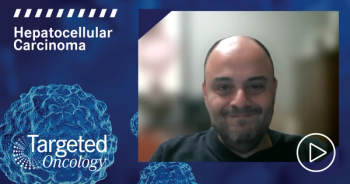
Targeting the VEGF Pathway in Hepatocellular Carcinoma
Episodes in this series

Richard S. Finn, MD: When we talk about validated targets in liver cancer, I think the one that sticks out in my mind is VEGF. You all can certainly weigh in on that. That is my personal opinion.
Before we had sorafenib, there were data evolving about the importance of vascular endothelial growth factor [VEGF] and the VEGF receptor in liver cancer. On imaging, liver cancers tend to be hypervascular. One of the treatments here is chemoembolization, right? That embolization component where we block off the blood supply to the tumor certainly can help people live longer and control these tumors.
And then the first drug to be approved in liver cancer was sorafenib. Sorafenib, like other drugs, is somewhat of a dirty kinase inhibitor. It clearly targets the VEGF receptor. It was approved in kidney cancer as a proof of concept. Then it was looked at in liver cancer versus placebo in the SHARP study, as well as a companion study done in the Asian-Pacific region. Both established sorafenib as the standard of care for advanced liver cancer, or liver cancer that had progressed.
That was based on data from 2007 and 2008 published in the New England Journal of Medicine that showed that sorafenib improved survival versus best supportive care on a median of about 3 months. That translated into a hazard ratio of about 0.69. And interestingly, it did that without inducing response. It improved survival by slowing progression, and PFS [progression-free survival] was significantly improved. It didn’t necessarily improve quality of life, but it didn’t decrease quality of life despite the fact that it has well known [adverse] effects in this population—the hand-foot syndrome; GI [gastrointestinal] toxicity, specifically diarrhea, anorexia, weight loss. There is some hypertension, but I don’t think that has been a big challenge when treating these patients.
I remember being interviewed in 2008. “Sorafenib is here. What do you think?” We thought, “Well, this is the golden age of liver cancer. We’ve proven that systemic treatment works. There will be a number of new studies and new drugs approved.” I was right, but I was off by about a decade. We went through a decade where we had no new drugs.
And then along came lenvatinib. Before I talk about the clinical data with lenvatinib, Michael, again, you and I were involved in a review article in Clinical Cancer Research about a year ago that explored the targeting of VEGF. Can you provide us some of your insight in regard to the strengths and weaknesses of targeting VEGF?
Michael A. Morse, MD, FACP, MHS: Well, as you pointed out, these are vascular tumors. It has now been proven with multiple drugs that have VEGF receptor TKI [tyrosine kinase inhibitor] activity that there’s activity in targeting that pathway. However, you’re also right that the drugs that have been most successful are those that are dirty kinase inhibitors. Which of the other targets is also relevant, or whether any of them are truly relevant, we don’t really know.
But the other issue is it’s also clear that the strength of the inhibition may affect activity. Lenvatinib inhibits VEGFR2 more effectively, or at lower concentrations, than sorafenib would. So to me, that also proves that it’s important to target VEGFR2, and then, perhaps, other pathways as well.
Transcript edited for clarity.





















